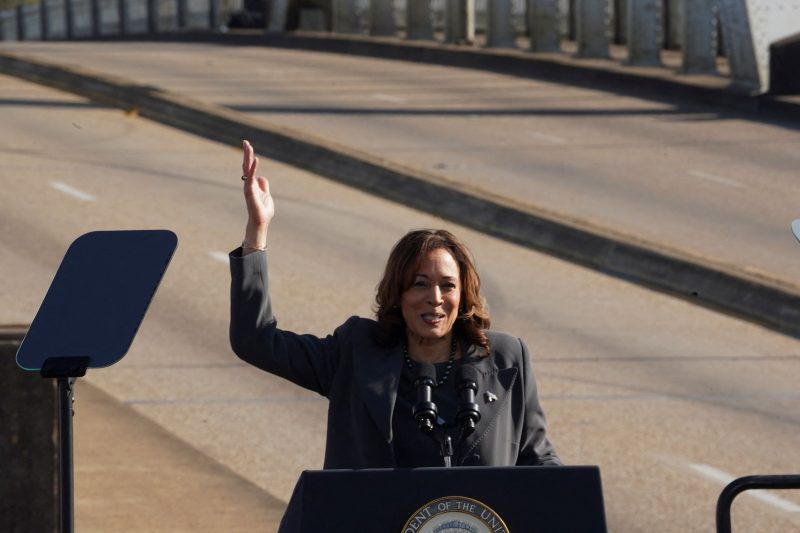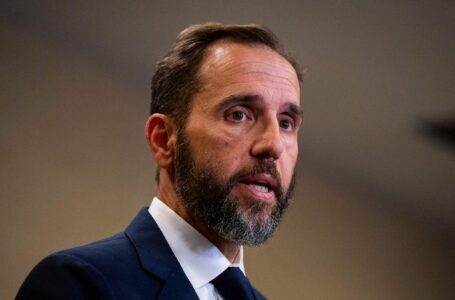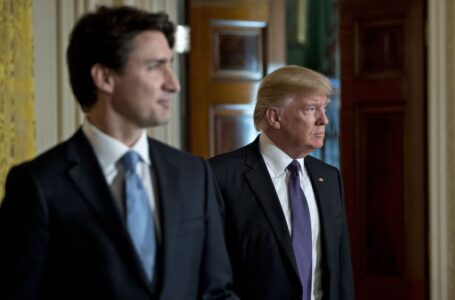Airstrike on village in western Myanmar kills at least 40 people, groups say
Harris takes more public role criticizing Israel’s actions in Gaza


Vice President Harris has begun taking a more public role in the Biden administration’s effort to handle the Gaza war, bluntly criticizing Israel on Sunday for limiting humanitarian aid and meeting Monday with Prime Minister Benjamin Netanyahu’s chief political rival.
Monday’s White House meeting with Benny Gantz — a centrist member of Israel’s war cabinet who traveled to the United States in defiance of Netanyahu — came after Gantz previously spoke with various American officials who have visited Jerusalem. But a Washington visit, particularly one that included a meeting with Harris, was seen as twisting the knife, given Netanyahu’s own strained relations with the president.
A White House summary of the meeting said Harris reiterated U.S. support for Israel but “expressed her deep concern about the humanitarian conditions in Gaza and the recent horrific tragedy around an aid convoy in northern Gaza.” That was a reference to the death Thursday of more than 100 Palestinians after an aid convoy was swarmed and Israeli soldiers opened fire.
A day earlier, Harris declared during a speech in Alabama that “the Israeli government must do more to significantly increase the flow of aid.” She added, “No excuses.”
Although Harris’s calls for a cease-fire echoed President Biden’s comments over the past week, she took a notably sharper tone, which comes as a growing number of Democrats are voicing their displeasure over Biden’s handling of Gaza in television interviews, protests, sternly worded statements — and at the ballot box.
“People in Gaza are starving. The conditions are inhumane,” Harris said. “And our common humanity compels us to act.”
Biden’s staunch support of Israel has long prompted criticism from human rights activists that the administration is complicit in what they see as Israel’s extreme reaction to the Oct. 7 attacks, when Hamas militants surged over the border, killing about 1,200 Israelis and taking about 250 hostages. The counteroffensive has disproportionately affected civilians and children, with disturbing images from the escalating humanitarian crisis ricocheting around the world.
U.S. officials are urgently trying to secure a six-week cease-fire in Gaza before Sunday, the start of the Muslim holy month of Ramadan. Israel has agreed to elements of the cease-fire deal, and now the onus is on Hamas, Harris said Sunday.
“Hamas claims it wants a cease-fire,” she said. “Well, there is a deal on the table. And as we have said, Hamas needs to agree to that deal.”
For months, Harris has privately expressed concerns about the plight of Palestinians, and she has also told advisers that younger voters view the Israeli-Palestinian conflict through a different lens than older ones, according to people familiar with her views, who spoke on the condition of anonymity to describe private talks.
Some activists saw an added significance in the setting of Harris’s remarks on Sunday, part of a prepared speech that aides said was cleared by Biden’s team. The vice president was speaking in Selma, Ala., during a commemoration of “Bloody Sunday,” when state troopers in 1965 brutally attacked civil rights marchers.
Some liberals have sought to link the plight of Palestinians with equity movements that involve marginalized communities, including Black Americans in the Jim Crow South, citizens of color in apartheid South Africa and, more recently, the Black Lives Matter movement.
Still, some activists were skeptical Monday of Harris’s more public outspokenness. “To me, this is a public relations and messaging shift,” said Waleed Shahid, a Democratic strategist who has been critical of the White House. “I don’t see a policy shift.”
He said the venue of Harris’s remarks was more revealing than her words.
“It’s significant that Vice President Harris made her messaging shift addressing a Black audience in Selma, which makes me think the White House is not only worried about losing Arab Americans, Muslim Americans and young people, but also older Black voters,” he said.
This is not the first time Harris has seemed to take a sharper tone than Biden on the Israel-Gaza war.
In a speech in Dubai in December, Harris used forceful language in calling on Israel to limit civilian casualties, and she spoke in more detail about Palestinian suffering, which Biden had seldom done at that point.
And her aides said she has made her views known privately as well. Harris has been particularly focused on the “day after” in Gaza, they said, as the United States and Israel have conflicting visions over what the future of the enclave will look like, with Biden strongly embracing the idea of a Palestinian state and Netanyahu dismissing it.
The vice president has also pushed Biden to address the concerns of the Arab and Muslim community in America since the beginning of the conflict. Shortly after the Oct. 7 Hamas attacks, Harris convinced the president to add a line addressing Islamophobia in a speech promising unconditional support for Israel.
Israel launched its military campaign after Hamas militants rampaged through the Israel-Gaza border fence on Oct. 7, and its war has now killed more than 30,000 Palestinians, according to the Gaza Health Ministry, displacing more than 80 percent of the population as people shelter in squalid conditions.
The United States conducted its first airdrop of food into Gaza on Saturday, although aid groups said it does not fundamentally address what is needed to prevent famine.
“We have seen reports of families eating leaves or animal feed, women giving birth to malnourished babies with little or no medical care, and children dying from malnutrition and dehydration,” Harris said on Sunday. “And just a few days ago, we saw hungry, desperate people approach aid trucks, simply trying to secure food for their families after weeks of nearly no aid reaching northern Gaza. And they were met with gunfire and chaos.”
Harris is not the only high-ranking Democrat to ratchet up her rhetoric on Gaza in recent days. “The collective punishment in Gaza has got to stop, and Israel must do more to protect civilian life,” Sen. Patty Murray (D-Wash.) said on the Senate floor late last week.
Sen. Chris Murphy (D-Conn.), a member of the Foreign Relations Committee, called scenes from the stampede and gunfire “appalling.” Sen. Chris Van Hollen (D-Md.), decrying the lack of aid getting into Gaza, said, “Enough is enough.”
For Harris and the Biden administration, the stakes are not just about a conflict nearly 7,000 miles away. Harris is the understudy to an 81-year-old president, and polls show that many Americans have questions about his ability to continue in the most demanding job in the world.
Coupled with those concerns are worries among some voters about how Harris would perform if she found herself at the top of the Democratic ticket or in the White House. On issues from reproductive rights to the Ukraine war, Harris has sought to reassure skeptics that she is a firm leader.
Harris’s recent actions reflect a fundamental shift in the administration’s posture as the war has unfolded over the past five months. Shortly after the Oct. 7 attacks, Biden took a whirlwind trip to Israel, sharing a brief hug with Netanyahu, attending a meeting of the Israeli war cabinet and speaking with survivors of the attacks.
In speaking with Gantz on Monday, Harris was meeting with a centrist politician who angered Netanyahu by coming to the United States this week. Harris told reporters on Monday that there is no dissonance between her views and Biden’s.
“The president and I have been aligned and consistent from the very beginning,” she said as she headed to her meeting with Gantz.
Gantz did not clear his travel plans with Netanyahu in advance, according to Israeli media reports. Instead, Gantz briefed Netanyahu on his itinerary on Friday, provoking an angry retort that “Israel only has one prime minister,” according to Ynet, which broke news of the spat over the weekend.
Netanyahu’s allies also have criticized Gantz’s trip. Finance Minister Bezalel Smotrich, speaking to members of his party, accused Gantz of letting himself be used by Biden administration figures who wanted “to drive a wedge between Israelis” to push their plans for a Palestinian state.
Netanyahu, who openly embraced former president Donald Trump, has long had a frosty relationship with Biden. As Biden and Harris have ramped up their criticism of Israel’s prosecution of the war in Gaza and its failure to facilitate more humanitarian aid, more Israelis are accusing Netanyahu of mishandling relations with the country’s most important ally.
Gantz’s trip appears to be exacerbating those tensions. Numerous outlets reported that Netanyahu had instructed Israel’s embassy in Washington to boycott Gantz’s meetings.
Netanyahu has plummeted in the polls in the wake of the Hamas attack, and Gantz is increasingly seen as his likely successor. A survey released by Israel’s Channel 13 on Monday showed Gantz’s National Unity party winning more than twice as many seats in the Israeli parliament as Netanyahu’s Likud party.
Hendrix reported from Jerusalem. Liz Goodwin contributed to this report.











